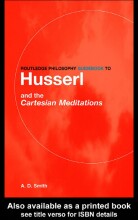First Meditation
14 important questions on First Meditation
What does epoché lead to?
What does it mean that the point of the epoché is the 'transcendental reduction'?
transcendental reduction= the restrictions of our philosophical enquiries to the field of 'subjectivity'.
What is transcendental insight?
- Higher grades + faster learning
- Never study anything twice
- 100% sure, 100% understanding
What is it for consciousness to be 'transcendental'?
What does object mean in 'consciousness constituting objects'?
What are the detailed tasks of phenomenology as 'constitutional research'?
Why can there be no experience, or generally consciousness, without objects?
What is the aim of transcendental phenomonoly, which has a universal field of enquiry?
Why are the 'positive' sciences naïve?
When is something (A intuition) self-given?
What is the synthesis of identification?
Difference presentation and presentification or presentiation.
What does "Phenomenology is chiefly a matter of 'sense-explication (and empty non-intuitional states are intrinsically objects of suspicion)'" mean?
Why apodicticity occur even in relation to self-evidences that are inadequate.
The question on the page originate from the summary of the following study material:
- A unique study and practice tool
- Never study anything twice again
- Get the grades you hope for
- 100% sure, 100% understanding































